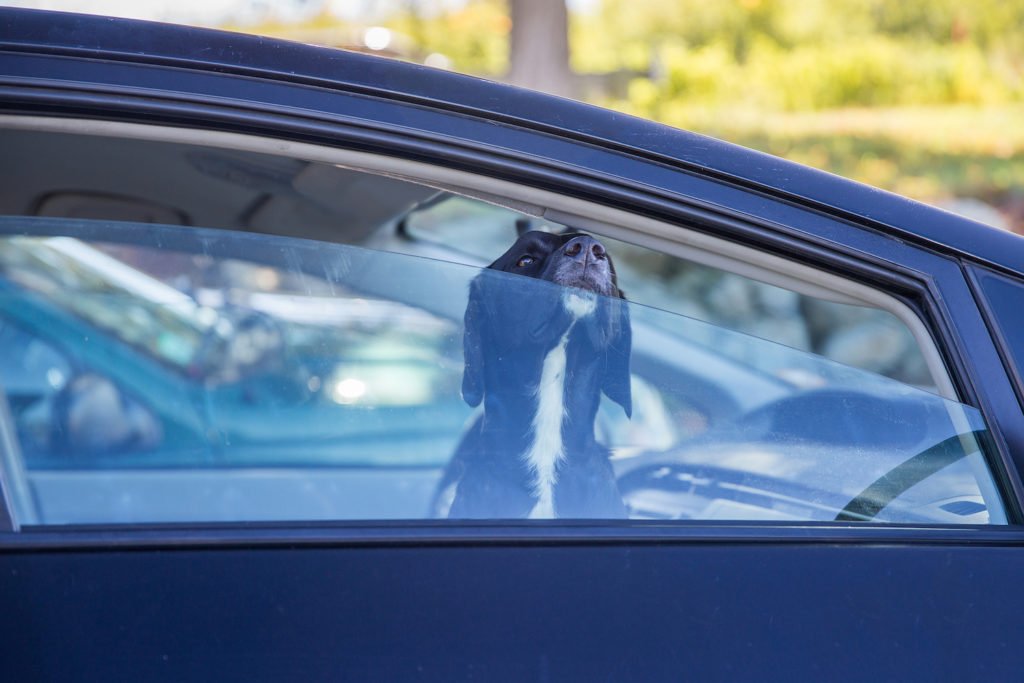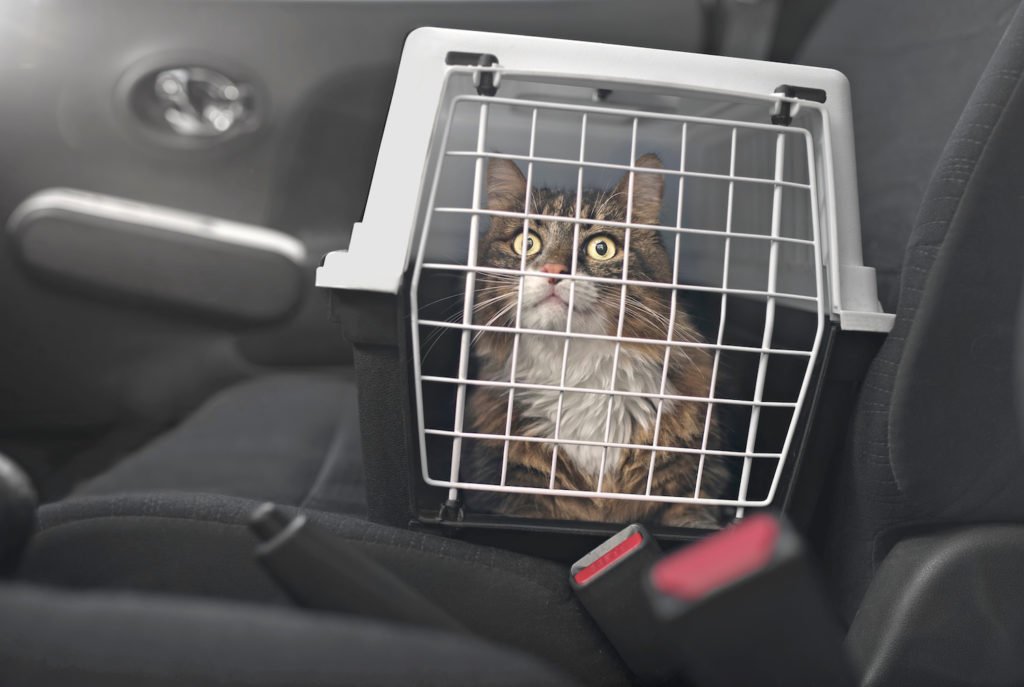Penal Code § 597.7 PC prohibits leaving an animal unattended in a motor vehicle under such conditions that would endanger its health or well-being. This is usually an infraction punishable by a $100 fine. However, it can lead to misdemeanor charges and jail time if the animal suffers great bodily injury.
The language of the code section reads as follows:
597.7. (a) A person shall not leave or confine an animal in any unattended motor vehicle under conditions that endanger the health or well-being of an animal due to heat, cold, lack of adequate ventilation, or lack of food or water, or other circumstances that could reasonably be expected to cause suffering, disability, or death to the animal.
Examples of unlawful acts
- leaving a pet dog in a parked car in 100-degree Fahrenheit weather.
- locking a cat in a truck with no food and water for an excessive amount of time.
- leaving an animal in a vehicle in extreme freezing conditions with no blankets.
Legal Defenses
If you are charged under this statute, you can raise a legal defense such as:
- there were no conditions that threatened an animal,
- you were falsely accused, and
- there was an emergency.
Penalties
A violation of California Penal Code Section 597.7 is charged as an infraction provided that the animal did not suffer great bodily injury. In such a case, the offense is punishable by a $100 fine.
If an animal suffers great bodily injury, then the offense is charged as a misdemeanor. The penalties include:
- custody in county jail for up to six months, and/or
- a maximum fine of $500.
Our criminal defense attorneys will answer the following questions about California pets in cars laws:
- 1. Is it illegal to leave my pet in the car in California?
- 2. Are there legal defenses to 597.7 PC?
- 3. What are the penalties?
- 4. Are there immigration consequences?
- 5. Can I get a conviction expunged?
- 6. Does a violation affect my gun rights?
- 7. Are there related crimes?
1. Is it illegal to leave my pet in the car in California?
In California, it is not necessarily illegal to leave your pet in a vehicle unattended. However, under Penal Code 597.7, it is a criminal offense to do so if the circumstances are such that it would endanger the health or well-being of the animal.
The law states that the following conditions may endanger an animal:
- excessive heat,
- excessive cold,
- lack of adequate ventilation,
- lack of food or water, and
- other circumstances that could reasonably be expected to cause suffering, disability, or death to the animal. 1 2
Further, the law is not limited to dogs and cats. It applies to all animals.3

PC 597.7 forbids leaving an animal unattended in a car in dangerous conditions.
2. Are there legal defenses to 597.7 PC?
Our criminal defense attorneys often draw upon three legal strategies to defend against charges under this statute. These include showing that:
- there were no harmful conditions that threatened an animal.
- you were falsely accused.
- there was an emergency.
No harmful conditions
You are only guilty under this statute if there were harmful conditions that threatened a confined animal (for example, extreme heat). Therefore, you can always raise the defense that there were no hurtful conditions and the animal was safe and protected from harm.
Falsely accused
Perhaps someone levied false allegations against you to get you into trouble. In these cases, evidence such as eyewitnesses and video surveillance can be helpful.
Example: Ann and Dave are fighting over their dog during their divorce. Ann calls the police and falsely claims that Dave kept the dog in the car overnight in the freezing cold. The D.A. initially charges Dave but then drops the case when Dave produces security video that shows he never left the dog in the car.
Emergency
You can always try to show that there was an emergency that made you violate the law.
Example: Jerry puts his dog in the car in order to drive him to the vet. It is 100 degrees outside. Jerry runs inside his house to get his wallet when he trips and breaks his leg.
It is an hour before a neighbor sees the dog and calls the police. Here, Jerry should not face charges because he was physically unable to help his dog or call for help.
3. What are the penalties?
If you violate this statute and the animal does not suffer great bodily injury, then the offense is charged as an infraction. The maximum penalty is a $100 fine.4
If, though, a violation leads to an animal suffering great bodily injury, then the offense is charged as a misdemeanor. The crime is punishable by:
- imprisonment in county jail (as opposed to state prison) for up to six months, and/or
- a maximum fine of $500.5
If the charge is a misdemeanor, note that a judge may award you with misdemeanor (or summary) probation in lieu of jail time.
4. Are there immigration consequences?
Some California crimes can lead to a non-citizen defendant being either:
- deported, or
- marked as inadmissible.
A violation of Penal Code 597.7, however, does not lead to either result and no negative immigration consequences occur.

Unlawfully leaving an animal unattended in a vehicle can be an infraction or a misdemeanor.
5. Can I get a conviction expunged?
If you are convicted under these laws, you can get the conviction expunged. This is provided you successfully complete:
- your jail term, or
- probation (whichever was imposed).
6. Does a violation affect my gun rights?
There are certain crimes in California (such as felony offenses) that result in you losing your gun rights.
However, the state’s gun laws say that a violation of this statute does not affect your ability to:
- own,
- purchase, or
- possess a gun.
7. Are there related crimes?
There are three crimes related to this statute. These are:
- California’s animal abuse and cruelty laws – PC 597,
- transporting an animal in a cruel or inhumane manner – PC 597a, and
- ill treatment of confined animals – PC 597t.
Animal abuse and cruelty laws – PC 597
Penal Code 597 PC is the main California law that defines the crime of animal abuse. The law makes it a crime to maliciously:
- kill,
- harm,
- maim, or
- torture an animal.
Note that you could be charged under both this statute and PC 597.7 since both laws criminalize harming an animal.
Transporting an animal in a cruel or inhumane manner – PC 597(a)
Penal Code 597a is the California law that makes it a misdemeanor to carry a domestic animal in a vehicle and do so:
- in a cruel manner, or
- while knowingly allowing it to be subjected to unnecessary cruelty of any kind.
While this statute involves the transporting of an animal, PC 597.7 pertains to leaving an animal in a stationary vehicle.
Ill treatment of confined animals – PC 597(t)
Penal Code 597t is the California statute on confined animals. It says that confined animals restricted by a leash or rope must have adequate:
- food,
- water, and
- shelter.
Unlike PC 597.7, this statute involves animals on a leash or rope rather than confined to a car.

Call our law firm for legal advice. We offer consultations.
For additional guidance or to discuss your case with a criminal defense attorney, we invite you to contact our law firm at the Shouse Law Group.
Legal References:
- California Penal Code 597.7a PC. The full language of the statute reads:
(a) A person shall not leave or confine an animal in any unattended motor vehicle under conditions that endanger the health or well-being of an animal due to heat, cold, lack of adequate ventilation, or lack of food or water, or other circumstances that could reasonably be expected to cause suffering, disability, or death to the animal.(b) (1) This section does not prevent a person from taking reasonable steps that are necessary to remove an animal from a motor vehicle if the person holds a reasonable belief that the animal’s safety is in immediate danger from heat, cold, lack of adequate ventilation, lack of food or water, or other circumstances that could reasonably be expected to cause suffering, disability, or death to the animal.
(2) A person who removes an animal from a vehicle in accordance with paragraph (1) is not criminally liable for actions taken reasonably and in good faith if the person does all of the following:
(A) Determines the vehicle is locked or there is otherwise no reasonable manner for the animal to be removed from the vehicle.
(B) Has a good faith belief that forcible entry into the vehicle is necessary because the animal is in imminent danger of suffering harm if it is not immediately removed from the vehicle, and, based upon the circumstances known to the person at the time, the belief is a reasonable one.
(C) Has contacted a local law enforcement agency, the fire department, animal control, or the “911” emergency service prior to forcibly entering the vehicle.
(D) Remains with the animal in a safe location, out of the elements but reasonably close to the vehicle, until a peace officer, humane officer, animal control officer, or another emergency responder arrives.
(E) Used no more force to enter the vehicle and remove the animal from the vehicle than was necessary under the circumstances.
(F) Immediately turns the animal over to a representative from law enforcement, animal control, or another emergency responder who responds to the scene.
(c) Unless the animal suffers great bodily injury, a first conviction for violation of this section is punishable by a fine not exceeding one hundred dollars ($100) per animal. If the animal suffers great bodily injury, a violation of this section is punishable by a fine not exceeding five hundred dollars ($500), imprisonment in a county jail not exceeding six months, or by both a fine and imprisonment. Any subsequent violation of this section, regardless of injury to the animal, is also punishable by a fine not exceeding five hundred dollars ($500), imprisonment in a county jail not exceeding six months, or by both a fine and imprisonment.
(d) (1) This section does not prevent a peace officer, firefighter, humane officer, animal control officer, or other emergency responder from removing an animal from a motor vehicle if the animal’s safety appears to be in immediate danger from heat, cold, lack of adequate ventilation, lack of food or water, or other circumstances that could reasonably be expected to cause suffering, disability, or death to the animal.
(2) A peace officer, firefighter, humane officer, animal control officer, or other emergency responder who removes an animal from a motor vehicle, or who takes possession of an animal that has been removed from a motor vehicle, shall take it to an animal shelter or other place of safekeeping or, if the officer deems necessary, to a veterinary hospital for treatment. The owner of the animal removed from the vehicle may be required to pay for charges that have accrued for the maintenance, care, medical treatment, or impoundment of the animal.
(3) A peace officer, firefighter, humane officer, animal control officer, or other emergency responder is authorized to take all steps that are reasonably necessary for the removal of an animal from a motor vehicle, including, but not limited to, breaking into the motor vehicle, after a reasonable effort to locate the owner or other person responsible.
(4) A peace officer, firefighter, humane officer, animal control officer, or other emergency responder who removes an animal from a motor vehicle or who receives an animal rescued from a vehicle from another person shall, in a secure and conspicuous location on or within the motor vehicle, leave written notice bearing his or her name and office, and the address of the location where the animal can be claimed. The animal may be claimed by the owner only after payment of all charges that have accrued for the maintenance, care, medical treatment, or impoundment of the animal.
(5) Except as provided in subdivision (b), this section does not affect in any way existing liabilities or immunities in current law, or create any new immunities or liabilities.
(e) Nothing in this section shall preclude prosecution under both this section and Section 597 or any other provision of law, including city or county ordinances.
(f) Nothing in this section shall be deemed to prohibit the transportation of horses, cattle, pigs, sheep, poultry, or other agricultural animals in motor vehicles designed to transport such animals for agricultural purposes.
This statute is cited in People v. Williams (Court of Appeal of California, Fourth Appellate District, Division One, 2017) D070512.
- See same.
- See same.
- California Penal Code 597.7c.
- See same.
